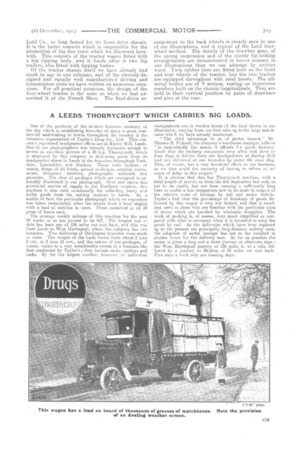A LEEDS THORNYCROFT WHICH CARRIES BIG LOADS.
Page 19

If you've noticed an error in this article please click here to report it so we can fix it.
One of the products of the modern business tendency of the day which is establishing branches of many a great commercial undertaking in towns throughout the country is the extensive organization of Taylor's Drug Co., Ltd. This concern's registered headquarter offices are at Burley Hill, Leeds. One of our photographers was recently fortunate enough to secure an excellent picture of a ao h.p. Thoreycroft, which is employed by this company in delivering goods from its headquarter stores in Leeds to the branches throughout. Yorkshire, Lancashire, and Durham, These loads include, of course, drugs of all kinds, patent medicines, surgical instruments, druggists' sundries, photographic materials and groceries. The class of packages which are consiped is admirably illustrated in our photograph. Over and above this provincial service of supply to the Northern counties, this machine is aleo used occasionally for collecting heavy and bulky gnorls from the railway stations in Leeds. As a matter of fact, the particular photograph which we reproduce was taken immediately after the return from a local station with a load of matches in cases. These contained in all 50 gross of boxes each.
The average weekly mileage of this machine for the past .10 weeks or so has proved to be 437. The longest run to date has been one of 156 miles out and back, and this was from Leeds to West Hartlepool, where the company has two branches. Two deliveries at Darlington branches were made en route. The weight of the loads varies from about 2 tons 5 cwt. to 3 tons 15 cwt., and the nature of the packages, of course, varies to a very considerable extent in a business like that conducted by Taylor's they include sacks, carboys and casks. By far the largest number, however, of individual
consignments are in wooden boxes of the kind shown iii our illustration, varying from one foot. cube up to the large matchcases which we have already mentioned.
" The chief advantage to us of jrnetor transit," Mr. Thomas H. Pickard, the company's warehouse manager, tells us "is undoubtedly the means it affords fiequick delivery: Goods that the railway companies very of ten took three or four days to deliver leave our headquarters at .8urley 11111 and are delivered at our branches by motor the same day. This, of course, has a very beneficial effect on our business, as we thus avoid the necessity of having to refuse on account of delay in this respect."
It is obvious that this fine Thornycroft machine, with a total length of service as from the 6th September last only as yet to its credit, has not been running a sufficiently long time to enable a fair comparison now to be made in respect of the relative costs of haulage by rail and motor vehicle. Taylor's find that the percentage of breakage of goods delivered by this wagon is very low indeed, and that is excellent news to those who are familiar with the particular class of stores which are handled by wholesale druggists. The work of packing is, of course, very much simplified as compared with what is necessary when it is intended to send the goods by rail. As the deliveries which have been replaced up to the present are principally long-distance railway ones, the adoption of motor haulage has not so far resulted in shorter hours for the delivery men. So far as paseible the motor is given a long and a short journey on alternate days : the West Hartlepool journey of 156 miles is, as a rule, followed by a journey to Skipton of 55 miles out and back. Five days a week only are running days.
























